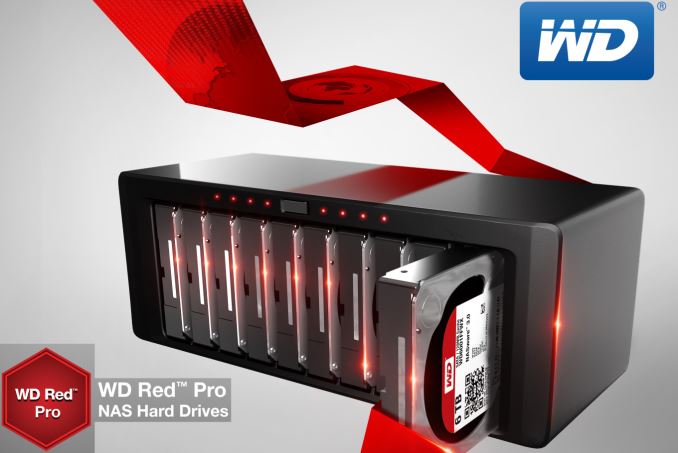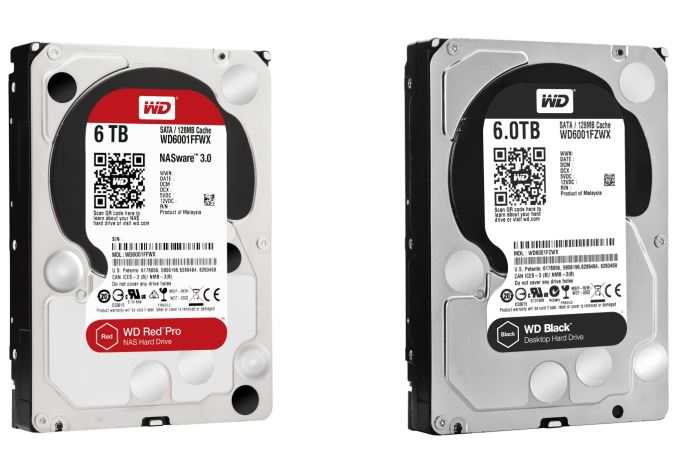Western Digital Updates WD Red Pro and WD Black with 5 & 6TB Models
by Ganesh T S on August 18, 2015 8:00 AM EST- Posted in
- NAS
- Storage
- Western Digital

It is that time of the year when Western Digital updates their Red lineup. Launched in 2012, the WD Red drives target network attached storage units with an optimized set of features for SMB / SOHO NAS units (up to 8 bays). It was initially launched in 1, 2 and 3TB capacities. In 2013, we saw a 4TB variant being added to the lineup along with some 2.5" drives. 2014 saw the addition of a Pro lineup (2,3 and 4TB) intended for use in NAS units with up to 16 bays. A 6TB Red version was also introduced. This year, we get 5 and 6TB WD Red Pro units. In addition, WD is also launching 5 and 6TB WD Black drives targeting gamers and creative professionals with a need for large capacity and high performance.
The important features of the WD Red Pro drives being announced today include:
- 128 MB cache
- Transfer rates up to 214 MBps
- Vibration tolerance and shock protection using a multi-axis shock sensor and dynamic fly-height technology
There doesn't seem to be any updates to the firmware (NASware 3.0, introduced last year, is retained). The Red Pro drives carry a 5 year warranty. The WD Red Pro 5TB version (WD5001FFWX) has a MSRP of $269, while the 6TB version (WD6001FFWX) is priced at $299. In terms of MSRP, this seems to be lower than the Seagate Enterprise NAS HDD by $50.
The WD Black is Western Digital's desktop hard drive lineup with a focus on performance. Similar to the WD Red Pro, the Black lineup is also getting 5 and 6TB members priced at $264 and $294 respectively. These drives also have a 128 MB cache and spin at 7200 RPM (just like the WD Red Pro units). While WD didn't provide hard performance numbers, the press release indicates that the 6TB version is 29% faster than the WD Black 4TB in terms of maximum data throughput, while scoring 10% more in PCMark Vantage. It also comes with a 5-year warranty.











51 Comments
View All Comments
Jerkkiller - Wednesday, August 19, 2015 - link
You didn't ask any questions, just a rethoric remark, some sappy imbecility, besides that just retreat back to the rotten, slimefilled shithole you crawled out, you self serving, self seeking, selfish egoistic brick.Guess what, nobody cares or gives a fuck about you or your shitty remarks or if something has anything to do with your intention of your muddleheaded self righteous blathering, just fuck off.
tamalero - Monday, August 24, 2015 - link
Well, a few people still cared and replied.Jerkkiller - Wednesday, August 19, 2015 - link
Thank you for providing this informative, factual, information, which represents an important distinction regarding the applicable usage scenarios.slideruler - Tuesday, August 18, 2015 - link
With what drive has WD (not HGST) responded to Seagates 8 TB drive? - Well, my point exactly.hlmcompany - Thursday, August 20, 2015 - link
Should WD be in a hurry to respond to Seagates 5900rpm Nearline drive when their HGST division already has a 7,200rpm 8TB Datacenter/NAS unit out?Jerkkiller - Wednesday, August 19, 2015 - link
Sappy, imbecile blathering.stephenbrooks - Tuesday, August 18, 2015 - link
If the 6TB is 29% faster than the 4TB, how much faster is it than a 1TB? In other words, if my PC is filled with 1TB HDDs, would I get a performance bump simply by replacing them with a larger capacity drive (or drives)? (Assume that I want more capacity than SSDs offer economically)dragonsqrrl - Tuesday, August 18, 2015 - link
That depends. Are your 1TB drives in RAID? Which 1TB drives do you own? If they're the latest WD Black, then any single read/write task you perform to one of your 1TB drives would have significantly higher throughput on the 6TB drive. Assuming the published performance gain is accurate, that would be ~230MBps max sequential read/write.stephenbrooks - Tuesday, August 18, 2015 - link
I work on a single Seagate 1TB 7200RPM drive that's about half full, no RAID, I just have a nightly incremental backup of it onto two others.But I need to check what version when I get home. Saw some reviews saying the 7200.12 was lousy but the 7200.14 was almost as fast (150-200MB/s) as this WD one. I have a nasty feeling I've got the 7200.12.
I guess I commented because this is an angle I don't see the HDD manufacturers normally pushing: that upgrading your conventional drive to a bigger one might give you a speed increase. For someone like me, the idea of a 30% speedup just from using a larger conventional HDD is quite appealing.
rtho782 - Wednesday, August 19, 2015 - link
It's the side benefit of an increase in density.A 1.5tb per platter drive reads more data in one revolution than a 1tb per platter drive, by a significant percentage.
However, if you have a range of drives with 1.5tb platters (say, a 1.5tb, a 3tb, a 4tb, and a 6tb), they will all perform similarly, although the 4tb may have an advantage by being short stroked.